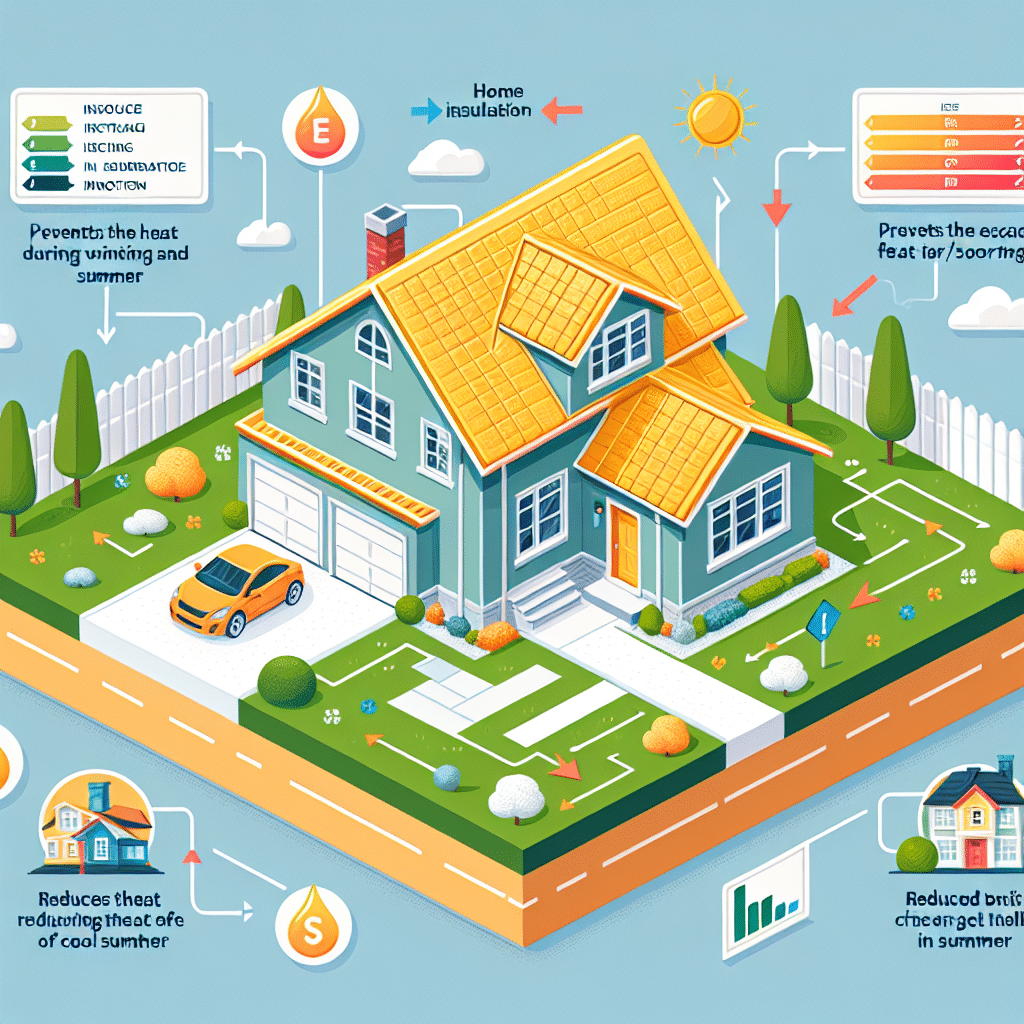Benefits of Home Insulation
-
Table of Contents
Home insulation is a critical component in modern residential construction and renovation, offering numerous benefits that enhance the comfort, efficiency, and sustainability of living spaces. Proper insulation helps maintain consistent indoor temperatures, reducing the need for excessive heating and cooling, which in turn lowers energy bills and decreases the household’s carbon footprint. Additionally, insulation can improve indoor air quality by minimizing the infiltration of outdoor pollutants and allergens. It also contributes to soundproofing, creating a quieter and more peaceful home environment. Overall, investing in high-quality home insulation is a cost-effective strategy that promotes energy efficiency, environmental responsibility, and enhanced living conditions.
Energy Efficiency Improvements Through Home Insulation
Home insulation plays a pivotal role in enhancing energy efficiency, offering a multitude of benefits that extend beyond mere cost savings. By creating a barrier that reduces the transfer of heat between the interior and exterior of a home, insulation significantly contributes to maintaining a consistent indoor temperature. This, in turn, reduces the reliance on heating and cooling systems, leading to lower energy consumption and, consequently, reduced utility bills. The financial savings realized from improved energy efficiency can be substantial over time, making insulation a wise investment for homeowners.
Moreover, the environmental impact of home insulation cannot be overstated. By decreasing the amount of energy required to heat or cool a home, insulation helps to reduce greenhouse gas emissions. This reduction is crucial in the fight against climate change, as it lessens the carbon footprint associated with residential energy use. In this way, home insulation not only benefits individual homeowners but also contributes to broader environmental sustainability goals.
In addition to energy savings and environmental benefits, home insulation enhances indoor comfort. Properly insulated homes experience fewer drafts and cold spots, creating a more stable and comfortable living environment. This is particularly important in regions with extreme weather conditions, where maintaining a consistent indoor temperature can be challenging. Insulation helps to mitigate these challenges, ensuring that homes remain warm in the winter and cool in the summer.
Furthermore, insulation can improve indoor air quality by reducing the infiltration of outdoor pollutants, allergens, and moisture. This is particularly beneficial for individuals with respiratory conditions or allergies, as it creates a healthier living environment. By preventing the ingress of moisture, insulation also helps to reduce the risk of mold growth, which can have serious health implications. Thus, the health benefits associated with home insulation are significant and should not be overlooked.
Another advantage of home insulation is its ability to enhance the structural integrity of a building. Insulation materials can provide additional support to walls, roofs, and floors, helping to protect against damage from external elements such as wind and rain. This added protection can extend the lifespan of a home, reducing the need for costly repairs and maintenance. In this way, insulation serves as a protective measure that preserves the value of a property over time.
Additionally, the installation of insulation can increase the resale value of a home. Prospective buyers are often attracted to energy-efficient properties due to the long-term cost savings and environmental benefits they offer. As a result, homes with high-quality insulation are likely to command higher market prices, providing a return on investment for homeowners who choose to insulate their properties.
In conclusion, the benefits of home insulation are multifaceted, encompassing energy efficiency, environmental sustainability, indoor comfort, health improvements, structural integrity, and increased property value. By investing in insulation, homeowners can enjoy immediate and long-term advantages that enhance their quality of life while contributing to broader societal and environmental goals. The importance of home insulation cannot be overstated, making it a critical consideration for anyone looking to improve their home’s energy efficiency and overall performance.
Cost Savings with Proper Home Insulation

Proper home insulation is a critical component in achieving cost savings for homeowners. By effectively managing the thermal envelope of a house, insulation plays a pivotal role in reducing energy consumption, thereby lowering utility bills. One of the primary ways insulation achieves this is by minimizing heat transfer. During the winter months, insulation helps retain heat within the home, reducing the need for continuous heating. Conversely, in the summer, it prevents external heat from infiltrating the living spaces, thereby decreasing the reliance on air conditioning systems. This dual functionality ensures that homes remain comfortable year-round while simultaneously reducing energy expenditures.
Moreover, the financial benefits of home insulation extend beyond immediate energy savings. Over time, the reduced strain on heating and cooling systems can lead to lower maintenance and replacement costs. Heating, ventilation, and air conditioning (HVAC) systems that do not have to work as hard to maintain a consistent indoor temperature tend to have a longer operational lifespan. This longevity translates into fewer repair bills and delayed replacement costs, further enhancing the cost-effectiveness of proper insulation.
In addition to direct financial savings, proper home insulation can also increase the overall value of a property. Energy-efficient homes are increasingly sought after in the real estate market, as prospective buyers are often willing to pay a premium for properties that promise lower utility costs and a smaller environmental footprint. Consequently, investing in high-quality insulation can yield a significant return on investment when it comes time to sell the property. This added value is not only a financial boon but also a testament to the growing awareness and importance of energy efficiency in modern housing.
Furthermore, the benefits of home insulation are not limited to financial aspects alone. Proper insulation contributes to a more stable and comfortable indoor environment. By reducing drafts and temperature fluctuations, insulation ensures a more consistent indoor climate, which can significantly enhance the quality of life for occupants. This improved comfort level can be particularly beneficial for individuals with health conditions that are exacerbated by extreme temperatures, such as asthma or arthritis.
Additionally, proper insulation can also contribute to soundproofing a home. Insulation materials, particularly those designed for thermal efficiency, often possess sound-dampening properties. This can be especially advantageous in urban areas or neighborhoods with high levels of external noise. By reducing the intrusion of external sounds, insulation can create a more peaceful and serene living environment, further enhancing the overall quality of life.
It is also worth noting that the environmental benefits of proper home insulation cannot be overlooked. By reducing energy consumption, insulated homes contribute to a decrease in greenhouse gas emissions. This reduction is crucial in the global effort to combat climate change and promote sustainable living practices. Homeowners who invest in proper insulation are not only saving money but also playing a part in preserving the environment for future generations.
In conclusion, the cost savings associated with proper home insulation are multifaceted, encompassing immediate reductions in utility bills, long-term savings on HVAC maintenance, and increased property value. Additionally, the enhanced comfort, soundproofing benefits, and positive environmental impact further underscore the importance of investing in high-quality insulation. As energy efficiency continues to gain prominence, the role of insulation in achieving cost-effective and sustainable living cannot be overstated.
Enhanced Comfort and Temperature Control with Home Insulation
Home insulation plays a crucial role in enhancing comfort and temperature control within a residence. By effectively managing the transfer of heat, insulation ensures that indoor environments remain stable and comfortable, regardless of external weather conditions. This stability is achieved through the reduction of heat loss during the winter and the minimization of heat gain during the summer. Consequently, homeowners can enjoy a more consistent and pleasant indoor climate throughout the year.
One of the primary benefits of home insulation is its ability to maintain a uniform temperature within the living space. Insulation materials, such as fiberglass, foam, and cellulose, act as barriers that impede the flow of heat. During colder months, these materials prevent warm air generated by heating systems from escaping through walls, ceilings, and floors. This retention of heat not only keeps the indoor environment warm and cozy but also reduces the need for constant heating, thereby lowering energy consumption and utility bills.
Conversely, in the summer, insulation works to keep the heat outside, ensuring that the cool air produced by air conditioning systems remains inside the home. This is particularly important in regions with extreme temperatures, where the cost of cooling can be substantial. By reducing the amount of heat that penetrates the home, insulation lessens the strain on cooling systems, leading to more efficient operation and further energy savings. This dual functionality of insulation in both heating and cooling scenarios underscores its value in promoting energy efficiency and cost-effectiveness.
Moreover, the enhanced temperature control provided by home insulation contributes significantly to overall comfort. A well-insulated home experiences fewer temperature fluctuations, which can be particularly beneficial for individuals with health conditions sensitive to temperature changes. Additionally, insulation helps to eliminate drafts and cold spots, creating a more uniformly comfortable environment. This consistent comfort level can improve the quality of life for residents, making their living spaces more enjoyable and inviting.
In addition to temperature regulation, home insulation also offers the advantage of noise reduction. Insulation materials can absorb sound, thereby diminishing the transmission of noise from outside sources such as traffic, construction, or neighborhood activities. This soundproofing effect can create a quieter and more serene indoor environment, further enhancing the comfort of the home. For those who work from home or have young children, the reduction in noise can be particularly beneficial, providing a more conducive atmosphere for productivity and rest.
Furthermore, the benefits of home insulation extend beyond immediate comfort and energy savings. Proper insulation can also contribute to the longevity and durability of a home. By preventing the buildup of moisture within walls and ceilings, insulation helps to protect the structural integrity of the building. Moisture can lead to issues such as mold growth and wood rot, which can compromise the safety and stability of a home. Therefore, insulation not only enhances comfort but also serves as a protective measure, preserving the home’s value over time.
In conclusion, home insulation is a vital component in achieving enhanced comfort and temperature control within a residence. Its ability to maintain consistent indoor temperatures, reduce energy consumption, and provide noise reduction makes it an invaluable investment for homeowners. Additionally, the protective benefits of insulation contribute to the long-term durability of the home, ensuring that it remains a safe and comfortable haven for its occupants. As such, the importance of home insulation cannot be overstated, making it a key consideration for anyone looking to improve their living environment.
Read more about Home Insulation
- Types of Home Insulation
- Choosing the Right Insulation for Your Home
- Common DIY Home Insulation Mistakes
- Insulation for Different Areas of Your Home
- Signs of Poor Home Insulation
- Home Insulation ROI (Return on Investment)
- How to Improve Home Insulation without Breaking the Bank
- Upgrading Home Insulation for Extreme Climates
- Maintaining and Updating Home Insulation








